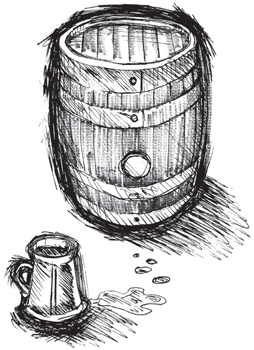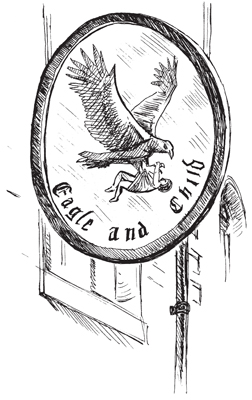Oxfordshire Folktales (28 page)
Read Oxfordshire Folktales Online
Authors: Kevan Manwaring

T
APROOM
T
ALES
T
HE
F
ARMER
AND
THE
F
IRKIN
There was a lazy, hard-drinking man who never lifted a finger to pitch in, unless it was harvesting time – when the farmer sent out a firkin of cider for the labourers, then he was the first to slake his thirst, hanging around out of turn.
They used to send him out to the middle-o’-field under everyone’s eye, however, when he thought no one was looking, stooping by the stooks, he would sneak back to the hedge for a sly swig. The other workers got pretty tired of this and hid the firkin, but he sneaked round and found it, and when they were all busy he ran off with it.
He’d had a good skinful already, so he made for the woods and lay down on the turf-side of a mound that had a hawthorn on it; a fairy thorn. He yawned – whether it was the sun, the cider, or the spell of the place, he soon found himself very drowsy.
Well, it was a nice enough spot to have a quick nap. Twenty winks, then, and he’d be back to work. All of a sudden he saw something small and green by the bank, then another, and then another, and then a whole crowd – pretty little folk, dancing around him, until they made him dizzy. He wanted to reach out and shoo them away, but somehow he couldn’t move; then, in a flash, he was alone and could move, so he did.

He picked up the firkin for a long swig. ‘Funny dream I had,’ he said, ‘all about … nothing.’
And the little voices all round twittered back at him, ‘And that’s what you’ll find in the firkin!’
![]()
This story was collected by Ruth Tongue, who heard it from a nurse in Middlesex hospital, who had been told it in her student days by a fellow student from Oxfordshire – who in her turn had heard it from her grandfather, an Oxfordshire farmer, about his own farm, in about 1900.
HE
D
ON
AND
THE
L
ANDLORD
Once in Bibury, in the Colne Valley, an Oxford student offered to teach the landlord of The Swan Inn how to draw strong and mild ale out of the same cask.
‘Mild and strong? Out of the same cask? It cannot be done!’
‘I shall show you. First I need an auger.’
One was fetched and the student drilled a hole near the bottom of the cask and told the landlord to stop it with his finger. Then he drilled another at the top of the cask and asked him to do the same with his other hand. ‘Oh, I’ve forgotten the spiggots!’ said the student. ‘Hold on a minute and I’ll just go and fetch them.’ He went out of the inn, got on his horse and rode away.
The landlord waited patiently at first. ‘What is taking that lad?’ He called out. No reply. He called again, and once again was met with silence. Growing a bit concerned – what if he had fallen or worse? – the landlord tried to wriggle free but was stuck firm. He called out, growing redder in the face. That student has pulled a prank on him! Luckily, another customer overheard and, much to the landlord’s embarrassment, relieved him of his prison. The landlord rose in fury, his face purple, and cursed after the student – who was long gone.
But the landlord had the best of it in the end. So many people came to laugh at him and his gullibility that his trade doubled – more than compensating for the ribbings he took. Since then, the landlord thought twice before listening to the ‘wisdom of students’.
![]()
There must be many such tales showing the long-term feud between town and gown. In some it is a canny local who gets one over on the gullible student. ‘The Oxfordshire Scholar’ ballad shows how many students were thought of as irresponsible and o verly fond of alcohol. Not much has changed!
T
HE
R
ABBIT
R
OOM
Memorabilia adorns me now – quiet photographs of the legends I once accommodated; a plaque commemorating their presence. Hordes of tourists come to visit; take snaps; film it with their phones; gasping in delight at how tiny the snug is, how quaint. They pretend to enjoy a pint of tepid English beer, the stodgy food. Enthusiasts linger. Writers stay even longer, sitting in the corner – the hallowed corner – trying to imbibe the atmosphere, to capture the ambience. They ponder on literary immortality while trying to ensure a place for their own ink-stained soul in the bardic firmament. Here is as good a spot as any cathedral or mosque. This last homely house, this Prancing Pony, is a wardrobe, a wood between the worlds, a portal to magical lands – to Middle Earth, Perelandra, Narnia, Logres. Once it was the rabbit hole to Wonderland and now it’s a knife-cut gateway to Jordan College, to quantum worlds beyond reckoning. The new chap has been in, of course, raised a glass to his antecedents, two fingers to Jack. Perhaps one day they’ll be visiting his old haunts? The God-botherers and the pagans; the atheist scholars and the fanatic movie devotees in costume; those who come to pay homage here. To breathe in the same air, well, almost – it no longer swirls with pipe smoke and cigarettes, but the fire still crackles in the grate; the pumps provide the same local ales; the kitchen still offers its homity pie; the barflies their homilies; and when it’s quiet – when the customers don’t drown out the silence with their chatter – the voices come back. The ghosts in the wall stir, those lost lunchtimes are replayed – a decade of Tuesdays – recorded like voices from long ago on wax cylinder and reel-to-reel, by the wooden Akashic record of my walls; listen, hear their voices …

J.R.R. Tolkien, pipe-smoker, Received Pronunciation, but at times fast and low; C.S. ‘Jack’ Lewis, donnish, slight trace of Ulster, at times stentorian; Owen Barfield, solicitor, a softer educated voice; Charles Williams, poet, novelist, occultist, North London accent; and now and then Charles Blagrove, landlord of the Eagle and Child, an Oxfordshire man.
One by one they would share their work and offer gruff, honest feedback. They would share tales from lands far away and, sometimes, closer to home…
![]()
Once there was a beautiful Queen who lived in a beautiful house. It had many elegant rooms in which to entertain elegant guests. And even lovelier were the gardens. The parterre had four-and-twenty square beds with Irish yews at the corners; the Italian garden had a large ornamental pool enclosed by yew hedges and set about with statues; beyond was a wild garden, with limetree avenues, shrubs, a stream and pond.
It had not always been so lovely.
When they had inherited this kingdom, her husband, the King, set his servants to work restoring it. It was a difficult time; the country had just gone to War – a land that is always there, waiting for the foolhardy to visit.
Many brave men went to the Land of War and never returned.
The Queen invited her beautiful friends, the Bloomsberries – many of whom did not believe in living by the sword. Some called them Conchies and accused them of cowardice. From the cruel tongues and the consensus madness they came seeking refuge. The bright, the brilliant and the beautiful: philosophers; poets; novelists; peace campaigners; aristocrats and socialists. They had many lovely parties where conversation flowed like champagne. To escape the war they worked on the land. The gardens prospered as the Queen’s house became a sanctuary of sanity in an insane world. The Queen took a lover and found happiness.
For a while, all was bliss.
Yet, amongst them was a traitor, a turncoat, who weaselled his way into their hearts until he won their trust and learnt their secrets and then, when he left with their love and praise ringing in his ears, he wrote poisonous things about them. Some say he was blinded; others that he had true sight and saw things as they truly were. A scandalous book was published, mocking them, and the spell of the palace was broken. The parties stopped, the gardens became neglected and overgrown, and the Queen and her husband, the King, moved out.
For a while they had pursued and found happiness. They had held off the barbaric tides with their cultured ways, but they could not fend off the enemy within – the worm in their hearts and the fool who saw.
* * *
The room settled back into its silence. There was a cough.
‘I detest allegory,’ Tolkien responded with a jab of his pipe.
‘At least it didn’t have another effing elf in it,’ quipped Jack, raising a glass to his old friend. The others pitched in, pulled the tale apart, always with good humour and a deep fondness for one another. Yet somehow, the enchantment remained – lingering in the air like pipe smoke as the conversation flowed.
Mingling with the voices are other sounds: the clink of coin and chink of glasses; laughter; the strike of a match; the puff of a pipe; and the crackle in the grate; the rustle of papers; murmurs of appreciation or snorts of good natured mockery; ripples of warm applause; coughs and scraping of chairs and farewells.
They kept meeting throughout the war – here and at other pubs in the city, unless prevented by ‘no beer’. Later in the war, before the D-Day landings, the American soldiers would come and drink the city dry. Yet the Inklings sustained each other from deeper wells, sharing work in progress, making conversation, supporting one another, living by their myths.
